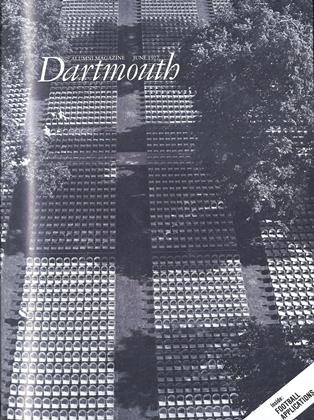The Class of 1981, now accepted by and accepting Dartmouth, has come in almost on target for the male-female ratio decreed in January by the Trustees.
The incoming freshmen, 741 men and 314 women, offer new testimony to the uncanny skill of the Admissions Office in predicting how many will accept the invitation of the College to join the student body. The Trustees had directed a goal of 750 men and 300 women for the class.
To select the prospective class of 1,055, the College accepted roughly 20 per cent of 2,326 women applicants and 25 per cent of 5,421 men applicants. As in other years since coeducation began, a significantly larger percentage of women than men accepted have notified the College that they plan to come. This year, it is 68 per cent for the women and 55 per cent for the men.
This differential in "yield," as admissions people call it, is similar to that experienced by Williams and Amherst and most of the other Ivy colleges. Only Harvard finds the yield substantially the same for both sexes.
Alfred T. Quirk '49, deputy director of admissions, attributes the differential in large part to the newness of coeducation at Dartmouth and other recently integrated schools. "Women are applying in greater numbers, and they still feel they are pioneering in a sense." Only time will tell, he says, whether the yield differential will disappear when the novelty of coeducation has worn off.
There has been some speculation that rural campuses may be more attractive to women because of a more secure environment which permits them greater freedom to move about than an urban campus might. Prospective women students do mention this factor when they visit the campus, Quirk says, but its significance is diluted to a considerable degree by the fact that urban members of the Ivy group, such as Brown, also find better yield among women applicants than men.
Historically, Dartmouth has lost more of the students it accepts to Harvard than to any other institution, a pattern which the women are following. With their minds apparently set from the start on a coeducational college, it is not surprising that few of them go to all-women's schools in preference to Dartmouth. As with the men, the greatest number choosing to go elsewhere will enroll at Harvard-Radcliffe in the fall.
"Harvard is almost nobody's back-up school," says Quirk.
 View Full Issue
View Full Issue
More From This Issue
-
 Feature
FeatureMerchant of Menace, Purveyor of Pleasure
June 1977 By DAN NELSON -
 Feature
FeatureYesterday's Glories Tomorrow's ?
June 1977 By JACK DeGANGE -
 Feature
FeatureThey Also Went Forth
June 1977 -
 Feature
FeatureCommencement
June 1977 By JAMES L. FARLEY '42 -
 Article
ArticleThe Valedictories
June 1977 By JOHN FINCH -
 Article
ArticleHonorary Degrees
June 1977
Article
-
 Article
ArticleTHE DEPARTMENT OF FINE ARTS EXHIBITIONS OF ETCHINGS AND OF COLOR-PRINTS
January, 1914 -
 Article
ArticleWHITEMAN'S ORCHESTRA ENLIVENS ALL HANOVER
January, 1926 -
 Article
ArticleFaculty Articles
June 1961 -
 Article
ArticleMesser Book Fund
June 1961 -
 Article
ArticleThe College
MAY 1978 By Douglas T. Schwarz '81 -
 Article
ArticleDaedalus with a Power Glove
OCTOBER 1994 By Karen Endicott


